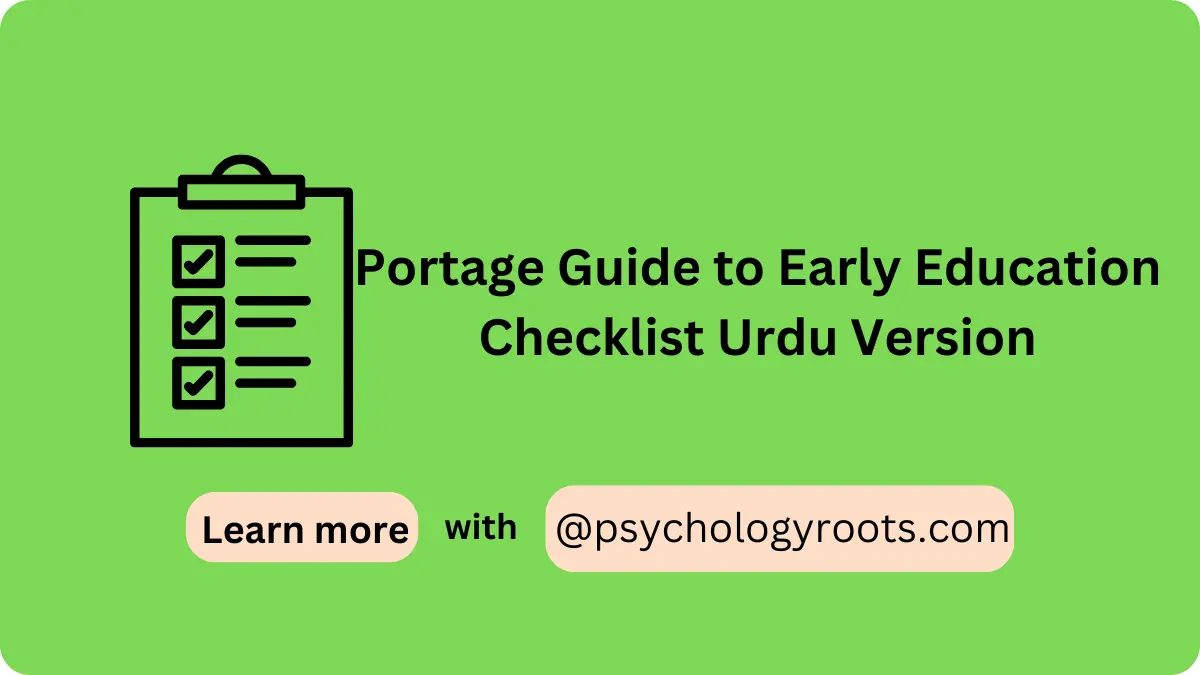Table of Contents
Portage Guide to Early Education Checklist Urdu Version
Here in this post, we are sharing the “Portage Guide to Early Education Checklist Urdu Version”. You can read psychometric and Author information. We have thousands of Scales and questionnaires in our collection (See Scales and Questionnaires). You can demand us any scale and questionnaires related to psychology through our community, and we will provide you with a short time. Keep visiting Psychology Roots.
About Portage Guide to Early Education Checklist Urdu Version
Scale Name
Portage Guide to Early Education Checklist Urdu Version
Author Details
Portage Project, Wisconsin, USA
Susan M. Bluma
Clincal Psychology Department, GC University Lahore
Translation Availability

Background/Description
The Portage Guide to Early Education is a comprehensive developmental tool designed to support early childhood education, particularly for children with developmental delays or disabilities. The Urdu version of this guide makes it accessible to educators, therapists, and families in Urdu-speaking regions, ensuring culturally relevant early intervention strategies.
The guide assesses children from birth to six years old across five developmental domains: cognitive, language, motor, social-emotional, and self-help skills. It provides structured checklists, progress-tracking tools, and culturally adapted activities to foster the child’s growth. The Urdu translation maintains the original’s integrity while addressing linguistic and cultural nuances, enhancing its effectiveness in Pakistani and Urdu-speaking communities.
Administration, Scoring and Interpretation
- Obtain a copy of the Portage Guide to Early Education Urdu Version from authorized sources or educational institutions.
- Explain the purpose: The guide assesses and develops a child’s skills in key developmental areas.
- Provide instructions in Urdu to parents, educators, or therapists on using checklists and activities.
- The assessment involves regular sessions, tailored to the child’s progress, typically lasting weeks or months.
- Administer the guide in a home or educational setting, involving parents or caregivers throughout the process.
Reliability and Validity
The Urdu version of the Portage Guide to Early Education maintains the strong reliability and validity of the original. Studies in Urdu-speaking populations confirm its effectiveness in promoting developmental gains, particularly for children with special needs. The standardized checklists and family-centered approach contribute to consistent results and high inter-rater reliability when used by trained professionals.
Available Versions
Multiple-Items
Reference
Portage Project. (n.d.). Portage Guide to Early Education. Wisconsin: Portage Project.
Bluma, S. M., & Shearer, M. S. (1976). Portage guide to early education. Portage Project.
Important Link
Scale File:
Frequently Asked Questions
What is the Portage Guide to Early Education Urdu Version?
It’s an Urdu-translated developmental tool for assessing and enhancing early childhood skills, especially for children with developmental delays.
Who can use this guide?
Urdu-speaking educators, therapists, and parents involved in early childhood intervention.
What developmental areas does it cover?
It covers cognitive, language, motor, social-emotional, and self-help skills.
Is the Urdu version different from the original?
No, it maintains the same structure and content, adapted linguistically and culturally for Urdu-speaking users.
How long does the assessment process take?
It’s an ongoing process tailored to each child’s needs, typically conducted over several weeks or months.
Disclaimer
Please note that Psychology Roots does not have the right to grant permission for the use of any psychological scales or assessments listed on its website. To use any scale or assessment, you must obtain permission directly from the author or translator of the tool. Psychology Roots provides information about various tools and their administration procedures, but it is your responsibility to obtain proper permissions before using any scale or assessment. If you need further information about an author’s contact details, please submit a query to the Psychology Roots team.
Help Us Improve This Article
Have you discovered an inaccuracy? We put out great effort to give accurate and scientifically trustworthy information to our readers. Please notify us if you discover any typographical or grammatical errors.
Make a comment. We acknowledge and appreciate your efforts.
Share With Us
If you have any scale or any material related to psychology kindly share it with us at psychologyroots@gmail.com. We help others on behalf of you.